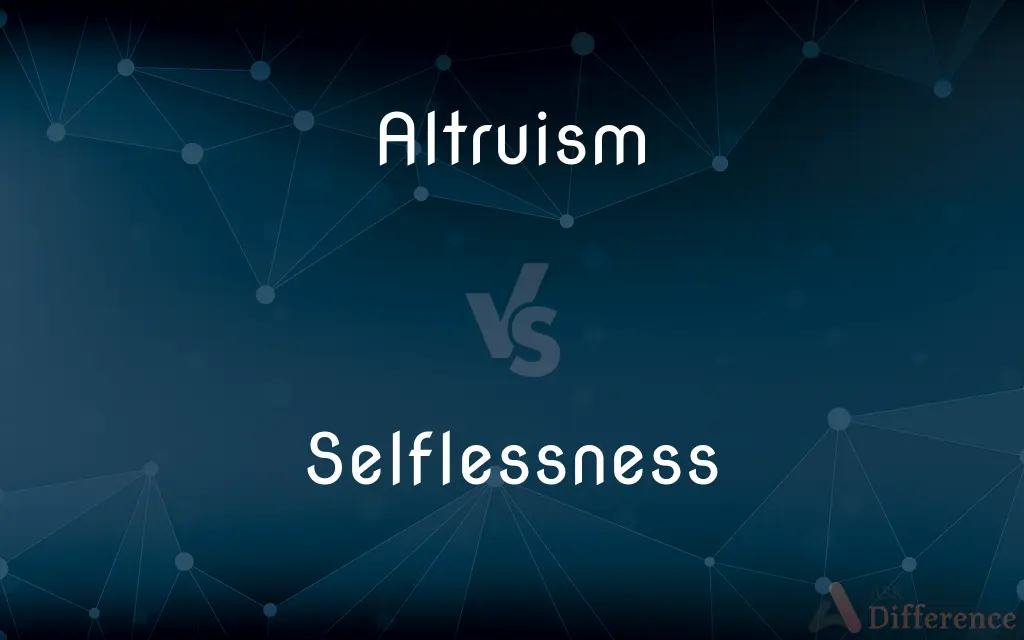Altruism vs. Selflessness — What's the Difference?
By Tayyaba Rehman — Published on January 3, 2024
Altruism is proactive kindness benefiting others, even at personal cost; selflessness is putting others' needs ahead of one's own. Altruism is action-driven; selflessness is attitude-driven.

Difference Between Altruism and Selflessness
Table of Contents
ADVERTISEMENT
Key Differences
Altruism and selflessness both revolve around the principle of prioritizing others over oneself. However, they manifest in different manners and are nuanced in their implications. Altruism is rooted in actions taken for the benefit of others, sometimes even if it means a personal sacrifice. It's about proactively seeking out ways to help or improve someone else's situation. Selflessness, on the other hand, denotes an attitude or a characteristic where one doesn't prioritize their own needs, desires, or interests above others'.
Altruism often involves a distinct act or series of actions. For instance, a person may donate a sum of money to a charitable cause or offer their skills for free to benefit someone else. This shows altruism because the person actively steps forward to make a difference. On the contrary, selflessness can be more passive. It's seen in the moments when a person offers the last piece of cake to another or steps back to let someone else have a turn.
In essence, altruism is a form of selflessness, but not all acts of selflessness can be classified as altruism. Altruism requires an active effort to benefit others, while selflessness is more about a disposition or mindset. A selfless individual might forego a personal benefit, but an altruistic person actively works towards creating benefits for others.
Altruism is a subcomponent of the broader concept of selflessness. While altruism emphasizes proactive beneficence, selflessness underlines a broader approach of not considering oneself superior or more important than others. Selflessness serves as the foundation, and altruism is one of the ways it can be manifested.
Comparison Chart
Nature
Action-oriented
Attitude-oriented
ADVERTISEMENT
Focus
Proactive help to others
Putting others' needs first
Manifestation
Specific acts of kindness
General disposition
Scope
Subset of selflessness
Broader concept
Benefit
Direct benefit to others
Indirect or direct benefit to others
Compare with Definitions
Altruism
The principle of selfless concern for others.
Her donation showcased her deep sense of altruism.
Selflessness
Prioritizing others above oneself.
Her selflessness made her share her prize with her teammates.
Altruism
Motivation to promote another's welfare.
The foundation's work in disaster relief was driven by altruism.
Selflessness
Generosity without thought of return.
Offering to pay for a stranger's meal was a gesture of selflessness.
Altruism
An intrinsic desire to help or improve others' well-being.
Volunteering at the shelter every weekend was a testament to his altruism.
Selflessness
Having little concern for one's own interests.
His selflessness was evident when he gave up his seat for the elderly lady.
Altruism
Behavior that benefits another at one's own expense.
His act of saving the child from the river was pure altruism.
Selflessness
Lack of egoism or self-concern.
Even in dire times, he showcased selflessness by helping his neighbors.
Altruism
Actions taken without expecting reciprocity.
Giving away his lunch to the homeless man was an act of altruism.
Selflessness
Showing unselfish concern for others.
She stayed up all night helping her friend, a true sign of selflessness.
Altruism
Unselfish concern for the welfare of others; selflessness.
Selflessness
Having, exhibiting, or motivated by no concern for oneself; unselfish
A selfless act of charity.
Altruism
(Zoology) Instinctive behavior that is detrimental to the individual but favors the survival or spread of that individual's genes, as by benefiting its relatives.
Selflessness
The quality or state of being selfless.
Altruism
Regard for others, both natural and moral without regard for oneself; devotion to the interests of others; brotherly kindness.
Selflessness
Quality or state of being selfless.
Altruism
Action or behaviour that benefits another or others at some cost to the performer.
Selflessness
The quality of unselfish concern for the welfare of others
Altruism
Regard for others, both natural and moral; devotion to the interests of others; brotherly kindness; - opposed to egoism or selfishness.
Selflessness
Acting with less concern for yourself than for the success of the joint activity
Altruism
The quality of unselfish concern for the welfare of others
Common Curiosities
Is altruism always selfless?
Typically, yes. Altruism involves actions benefiting others, often at a personal cost.
Why do people practice altruism?
Reasons vary, from moral beliefs to empathy, or even for personal satisfaction.
Is altruism always visible?
No, many acts of altruism might go unnoticed or are done privately.
Can selflessness be taught?
Yes, through exposure to diverse perspectives, empathy training, and role models.
Are altruism and selflessness the same?
No, while both prioritize others, altruism is action-driven, and selflessness is attitude-driven.
Can someone be selfless but not altruistic?
Yes, a selfless person may not always actively help others, which is central to altruism.
Can altruism have ulterior motives?
Some argue certain altruistic acts may be driven by a desire for recognition or personal gain.
How can one cultivate selflessness?
Through empathy, understanding others, and practicing acts of kindness regularly.
Can businesses operate on selflessness?
While profit is essential, businesses can adopt selfless values, like corporate social responsibility.
Can selflessness be harmful?
Extreme selflessness may lead to neglecting one's own needs, which can be harmful.
Is selflessness innate or learned?
It can be both. Some people naturally lean towards it, while others learn through experiences.
Are altruism and charity synonymous?
Not necessarily. While charity can be an act of altruism, altruism encompasses more than monetary giving.
Why is selflessness valued in society?
It promotes communal harmony, cooperation, and a sense of shared humanity.
How does altruism benefit society?
Altruism fosters kindness, reduces selfishness, and encourages mutual support.
What's the psychological basis for altruism?
Altruism may stem from empathy, moral values, or a sense of community belonging.
Share Your Discovery

Previous Comparison
Homogeneous Reactions vs. Heterogeneous Reactions
Next Comparison
CRR vs. SLRAuthor Spotlight
Written by
Tayyaba RehmanTayyaba Rehman is a distinguished writer, currently serving as a primary contributor to askdifference.com. As a researcher in semantics and etymology, Tayyaba's passion for the complexity of languages and their distinctions has found a perfect home on the platform. Tayyaba delves into the intricacies of language, distinguishing between commonly confused words and phrases, thereby providing clarity for readers worldwide.














































